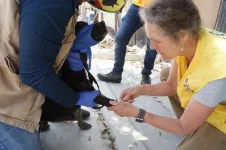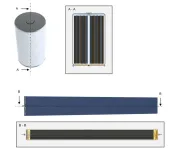(Press-News.org) Researchers from The University of Texas at Arlington and the University of California–San Francisco have used a new brain-mapping technique to identify memory-related brain cells vulnerable to protein buildup, a key factor in the development of Alzheimer’s disease, an incurable, progressive brain disorder that slowly destroys memory and thinking skills.
In Texas, nearly half a million people live with Alzheimer’s disease, a form of dementia that costs the state approximately $24 billion in caregiver time, according to the Texas Department of State Health Services. Texas ranks fourth in the nation for Alzheimer’s cases and second in Alzheimer’s-related deaths.
To understand why certain parts of the brain are more affected by Alzheimer's disease, researchers focused on tau, a protein that accumulates in brain cells and disrupt normal activity. Using the MISS (Matrix Inversion and Subset Selection) mapping technique, which profiled approximately 1.3 million cells, the research team created detailed maps of different cell types in the brains of mice. They compared these maps to areas where tau builds up to identify which cell types are most affected. Their findings are published in the peer-reviewed journal Nature Communications Biology.
“Using mathematical and computational models, we found that certain cells in the hippocampus, a brain area important for memory and navigation, are more vulnerable to tau buildup,” said author Pedro Maia, an assistant professor of mathematics at UTA. “These glutamatergic neurons showed a strong connection with tau deposits, meaning they are more likely to be affected. In contrast, brain cells in the cortex—the part of the brain that controls movement, sensory information, emotions and reasoning—were less likely to be affected by tau.”
Interestingly, the researchers also discovered that oligodendrocytes, brain cells that help insulate nerve fibers, were less affected by tau. This suggests that these cells might help to protect the brain against tau buildup.
The study also found that the distribution of different cell types in the brain may better predict where tau accumulation occurs than genetic factors alone. This implies that the types of cells present in different brain regions may be more important than Alzheimer’s-related genes in determining vulnerability to tau.
“Overall, this study helps us understand why certain brain regions are more affected by tau buildup leading to Alzheimer's disease,” Dr. Maia said. “By identifying the cell types and gene functions involved, our study showcases how theoretical and computational models can provide new insights into the progression of Alzheimer’s disease. This is another piece of valuable data that will help us specifically target the vulnerable cells and genes associated with tau buildup, potentially slowing or preventing Alzheimer's disease progression in the future.”
To learn more about Maia’s work, visit the NSF RTG Training in Mathematics for Human Health program, which he co-leads on computational neurology.
This work was supported by the following NIH grants: R01NS092802, RF1AG062196 and R01AG072753.
About The University of Texas at Arlington (UTA)
Located in the heart of the Dallas-Fort Worth Metroplex, The University of Texas at Arlington is a comprehensive teaching, research, and public service institution dedicated to the advancement of knowledge through scholarship and creative work. With an enrollment of approximately 41,000 students, UT Arlington is the second-largest institution in the UT System. UTA’s combination of outstanding academics and innovative research contributes to its designation as a Carnegie R-1 “Very High Research Activity” institution, a significant milestone of excellence. The University is designated as a Hispanic Serving-Institution and an Asian American Native American Pacific Islander-Serving Institution by the U.S. Department of Education and has earned the Seal of Excelencia for its commitment to accelerating Latino student success. The University ranks in the top five nationally for veterans and their families (Military Times, 2024), is No. 4 in Texas for advancing social mobility (U.S. News & World Report, 2025), and is No. 6 in the United States for its undergraduate ethnic diversity (U.S. News & World Report, 2025). UT Arlington’s approximately 270,000 alumni occupy leadership positions at many of the 21 Fortune 500 companies headquartered in North Texas and contribute to the University’s $28.8 billion annual economic impact on Texas.
END
Brain mapping unlocks key Alzheimer’s insights
A UTA, University of California–San Francisco study explores why some nerve cells are more vulnerable to neurodegeneration
2025-03-06
ELSE PRESS RELEASES FROM THIS DATE:
Clinical trial tests novel stem-cell treatment for Parkinson’s disease
2025-03-06
A recently launched Phase 1 clinical trial at Mass General Brigham is examining the safety and feasibility of a groundbreaking treatment approach for Parkinson’s disease in which a patient’s stem cells are reprogrammed to replace dopamine cells in the brain damaged by the disease. The first-of-its-kind trial of an autologous stem cell transplant, based on research and technologies invented and validated preclinically at McLean Hospital’s Neuroregeneration Research Institute (NRI), has enrolled and treated three patients at Brigham and Women’s ...
Awareness of rocky mountain spotted fever saves lives
2025-03-06
Rocky Mountain spotted fever is a bacterial infection spread by biting ticks to humans and dogs. Found on every continent except Antarctica, the infectious disease has been spreading since the early 2000s, most notably in Mexico and Brazil. Of the cases reported, more than half of infected people and dogs die.
A paper led by the University of California, Davis, highlights one of the most effective but often missing solutions to surviving this preventable, deadly disease: awareness. Most fatal cases stem from delays in diagnosis and treatment.
“The No. 1 thing that prevents human death from Rocky Mountain spotted fever is for everyone at high risk to know ...
Breakthrough in noninvasive monitoring of molecular processes in deep tissue
2025-03-06
The prestigious journal Advanced Materials recently published a groundbreaking study introducing a new method for monitoring molecular processes deep within tissue. Developed at the Technion - Israel Institute of Technology, the innovation is expected to accelerate key advancements in personalized medicine, cancer diagnosis, and early disease detection. The research was led by Prof. Hossam Haick, postdoctoral fellow Dr. Arnab Maity, and Ph.D. student Vivian Darsa Maidantchik from the Wolfson Faculty of Chemical Engineering at the Technion. The study also involved Dr. Dalit Barkan, research assistant Dr. Keren ...
BU researcher named rising star in endocrinology
2025-03-06
(Boston)—Sun Lee, MD, MSc, assistant professor of medicine at Boston University Chobanian & Avedisian School of Medicine, has been awarded an American Association of Clinical Endocrinology (AACE) Rising Star in Endocrinology Award.
The honor is presented to a physician who is within 10 years of completing their endocrine fellowship and has demonstrated actionable outcomes in outstanding leadership, teamwork and/or innovation in support of AACE’s mission to elevate clinical endocrinology ...
Stressed New Yorkers can now seek care at Mount Sinai’s new resilience-focused medical practice
2025-03-06
The Center for Stress, Resilience and Personal Growth at Mount Sinai—a first-of-its-kind initiative launched in April 2020 at the height of the COVID-19 pandemic to address its psychosocial impact on Mount Sinai Health System’s workforce—is now offering confidential behavioral health treatment services to New Yorkers generally.
A team of clinical psychologists, psychiatrists, and licensed clinical social workers from the Center is now available to individuals 18 years and older who are interested in and could benefit from behavioral health treatment. Clinical services include cognitive behavioral therapy, ...
BU researchers uncover links between metabolism and aggressive breast cancer
2025-03-06
(Boston)—More than 120 million Americans suffer from diabetes or pre-diabetes. Triple-negative breast cancer (TNBC) is the most aggressive form of breast cancer, and TNBC patients with obesity-driven diabetes often have worse outcomes.
A new study by researchers from Boston University Chobanian & Avedisian School of Medicine helps explain why this happens and suggests a potential way to improve treatment for these patients.
At present, oncologists do not consider patients with breast cancer and obesity-driven diabetes differently in any significant way from patients with breast cancer who are otherwise healthy.
The new study, "Insulin Resistance Increases ...
Engineers took apart batteries from Tesla and China’s leading EV manufacturer to see what’s inside
2025-03-06
Two main manufacturers dominate the EV (electric vehicle) market: Tesla, which is most popular in Europe and North America, and BYD, which leads the Chinese EV market. However, both manufacturers have released limited data about their batteries, so the mechanical structure and characteristics of these battery cells has remained mysterious. To compare the batteries used by each manufacturer and better understand how EV batteries function overall, a team of researchers took one of each apart.
The results publish on March 6 in the Cell Press journal Cell Reports Physical Science and show that Tesla’s batteries prioritize high-energy density and performance, ...
Paralyzed man moves robotic arm with his thoughts
2025-03-06
Researchers at UC San Francisco have enabled a man who is paralyzed to control a robotic arm through a device that relays signals from his brain to a computer.
He was able to grasp, move and drop objects just by imagining himself performing the actions.
The device, known as a brain-computer interface (BCI), worked for a record 7 months without needing to be adjusted. Until now, such devices have only worked for a day or two.
The BCI relies on an AI model that can adjust to the small changes ...
Planetary science: More potential locations for ice on Moon
2025-03-06
Ice may be present a few centimetres below the Moon’s surface in more areas of the lunar polar regions than was previously thought due to large, yet highly localised, variations in surface temperatures. The results, published in Communications Earth & Environment, are derived from direct measurements taken at the lunar surface in 2023 by the Indian Chandrayaan-3 mission.
Future long-term exploration (or habitation) of the Moon will likely depend on the availability of ice to provide water, with the likelihood of ice formation in a ...
Injectable Therapy is 'magic' for those who can’t take HIV pills
2025-03-06
UCSF researchers are the first to demonstrate that the approach works for the patients who need it the most.
Patients who struggle to take daily HIV pills can benefit from long-acting injectable treatments, a new study by researchers at UCSF has found.
The strategy could also help stop the spread of HIV by keeping more patients from being infectious.
In 2021, federal regulators approved the first long-acting antiretroviral (LA-ART) injectable, which is a combination of long-acting cabotegravir and ...
LAST 30 PRESS RELEASES:
Machine learning reveals Raman signatures of liquid-like ion conduction in solid electrolytes
Children’s Hospital of Philadelphia researchers emphasize benefits and risks of generative AI at different stages of childhood development
Why conversation is more like a dance than an exchange of words
With Evo 2, AI can model and design the genetic code for all domains of life
Discovery of why only some early tumors survive could help catch and treat cancer at very earliest stages
Study reveals how gut bacteria and diet can reprogram fat to burn more energy
Mayo Clinic researchers link Parkinson's-related protein to faster Alzheimer's progression in women
Trends in metabolic and bariatric surgery use during the GLP-1 receptor agonist era
Loneliness, anxiety symptoms, depressive symptoms, and suicidal ideation in the all of us dataset
A decision-support system to personalize antidepressant treatment in major depressive disorder
Thunderstorms don’t just appear out of thin air - scientists' key finding to improve forecasting
Automated CT scan analysis could fast-track clinical assessments
New UNC Charlotte study reveals how just three molecules can launch gene-silencing condensates, organizing the epigenome and controlling stem cell differentiation
Oldest known bony fish fossils uncover early vertebrate evolution
High‑performance all‑solid‑state magnesium-air rechargeable battery enabled by metal-free nanoporous graphene
Improving data science education using interest‑matched examples and hands‑on data exercises
Sparkling water helps keep minds sharp during long esports sessions
Drone LiDAR surveys of abandoned roads reveal long-term debris supply driving debris-flow hazards
UGA Bioinformatics doctoral student selected for AIBS and SURA public policy fellowship
Gut microbiome connected with heart disease precursor
Nitrous oxide, a product of fertilizer use, may harm some soil bacteria
FAU lands $4.5M US Air Force T-1A Jayhawk flight simulator
SimTac: A physics-based simulator for vision-based tactile sensing with biomorphic structures
Preparing students to deal with ‘reality shock’ in the workplace
Researchers develop beating, 3D-printed heart model for surgical practice
Black soldier fly larvae show promise for safe organic waste removal
People with COPD commonly misuse medications
How periodontitis-linked bacteria accelerate osteoporosis-like bone loss through the gut
Understanding how cells take up and use isolated ‘powerhouses’ to restore energy function
Ten-point plan to deliver climate education unveiled by experts
[Press-News.org] Brain mapping unlocks key Alzheimer’s insightsA UTA, University of California–San Francisco study explores why some nerve cells are more vulnerable to neurodegeneration



